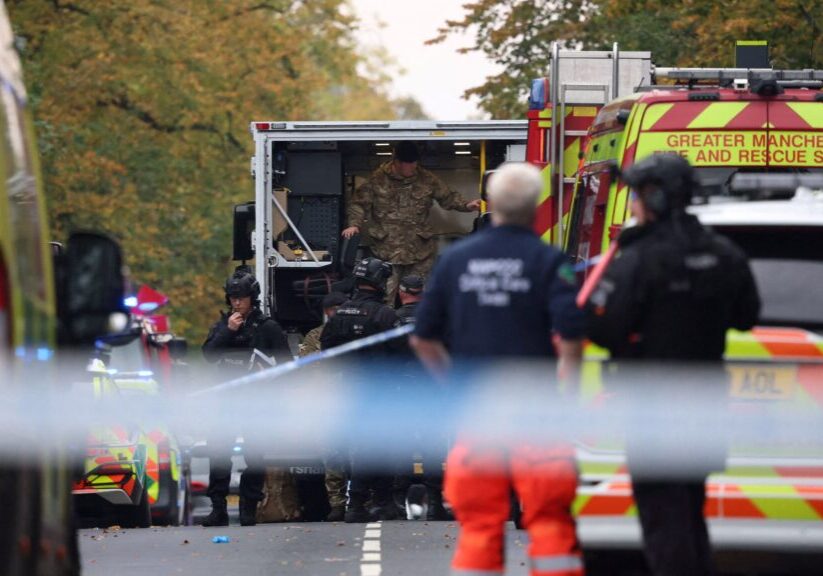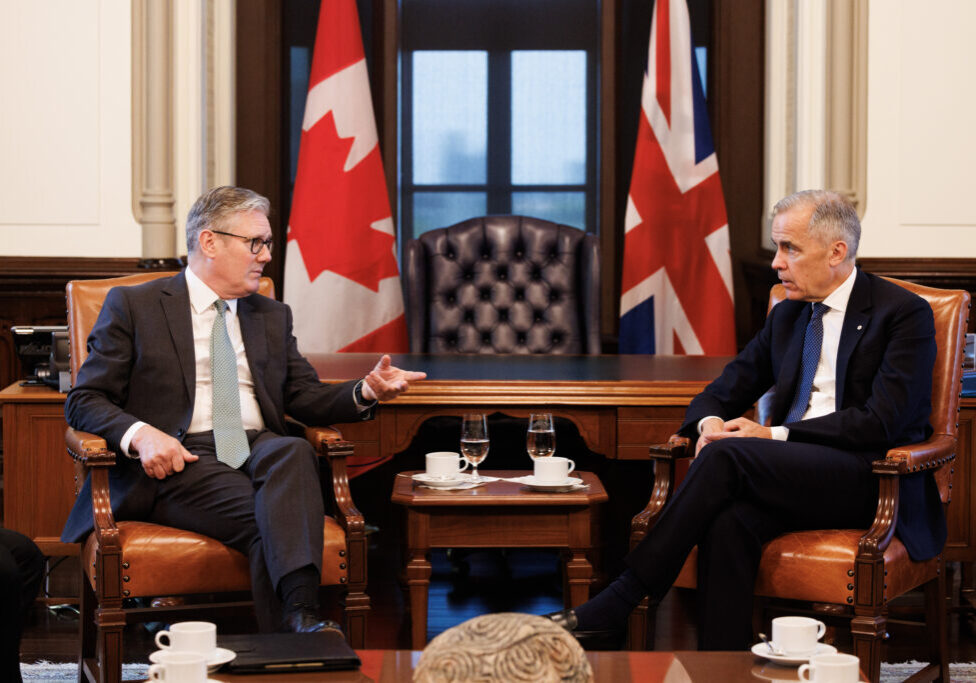Australia/Israel Review
The Legacy of Londonistan
Dec 1, 2006 | Douglas Davis
By Douglas Davis
 |
| Some 160,000 of Britain’s 1.8 million Muslims support terror acts on British soil |
Five years ago, at the time of 9/11, British intelligence agents were identifying 250 “primary” terrorist suspects a year in Britain. Two years later, the figure had doubled to 500. Last month, the head of MI5, Dame Eliza Manningham-Buller, said her intelligence agency was currently monitoring 1,600 suspects, who are believed to be engaged in at least 30 separate plots aimed at wreaking death and destruction.
A total of 3,000 young British Muslims are believed to have undergone training at al-Qaeda camps, and it was initially thought that Manningham-Buller’s rare public pronouncement was intended to prod the Government into pouring more funds down the throat of the intelligence service. Not so. Her message was the bleak assessment: Islamic terrorism would remain a fact of life for a generation.
True, the agency has had its successes, like last month’s conviction of Dhiren Barot, who had been trained by al-Qaeda in Afghanistan. He was sentenced to at least 40 years’ imprisonment for plotting to blow up transatlantic airliners and various high-profile targets in and around New York. Barot’s trial was just one of dozens of terror cases that are currently clogging Britain’s legal pipeline.
But MI5 has also had its near-misses, like the London-born, al-Qaeda-trained Richard Reid, known as the “shoe bomber”. Reid’s abortive attempt to detonate explosives hidden in the heels of his trainers on American Airlines Flight 63 from Paris to Miami in December 2001 earned him a life sentence in the United States.
And the agency has had its spectacular failures, like the simultaneous suicide bombings of three London Underground trains and a bus on July 7 last year. The attack claimed a total of 54 lives. It has since emerged that MI5 had been tipped off about two of the bombers well in advance, but, after what was described as “a quick assessment,” the agency concluded that they did not pose an immediate threat.
In her doomsday pronouncement, Manningham-Buller was not angling for more funds; the Government had already doubled her budget. Rather, she was preparing the public for a grim fact of life: further attacks on British targets are inevitable. Based on past experience, if even one of the current 30 plots becomes “active,” fully one-half of MI5’s resources will be engaged. If three become “active” simultaneously – just 10 per cent of the plots that are actually known to be in progress – the 2,800-strong agency would, quite simply, be unable to cope.
Earlier this year, MI5 was said to be facing an internal revolt by officers alarmed about intelligence failures and the lack of resources to fight Islamic terrorism. The Government’s increased financial allocation will enhance MI5’s capacity for surveillance, reconnaissance and analysis, but it will not provide anything close to a guarantee of success. Moreover, additional injections of cash will only limit the damage. The scale of the challenge has now grown too large to contain.
The problem is exacerbated by the rich hinterland in which Islamic terrorists are able to operate in Britain. The thoroughly modern Islamic terrorist conducts his business in small discrete cells that are separate from each other and from the 1.8-million Muslim population. But there is, apparently, sufficient support within that community to provide a cloak of acceptability. Opinion polls conducted among Britain’s Muslims indicate that about 160,000 support terrorist acts on British soil.
That should not have come as a complete surprise. For years, Britain has been a haven for Islamic extremists, whether from south Asia or the Middle East. Not for nothing has its capital been dubbed “Londonistan.” Deliberate, official inertia had allowed Britain to become not only the watering hole for extremism but also the European centre for logistical planning, the dissemination of propaganda (via mosques, the internet, audio-cassettes), as well as the centre for old-fashioned, low-tech fund-raising.
There was a clear understanding that the authorities would block their ears to the hate-filled preachings of Islamic clerics and turn a blind eye to their ancillary activities as long as there was no blood on British streets. That cosy arrangement, which had attracted bitter recriminations from the Middle East – particularly Saudi Arabia and Egypt – and from Britain’s partners in Europe, ended abruptly after the London bombings. Within days, Prime Minister Tony Blair was solemnly intoning: “The rules of the game have changed.” Too late.
By then, the preachers had done their work and the minds of a generation of young Muslims had been contaminated. The effect can be measured in the statistics provided by Manningham-Buller and by the estimate that no fewer than 3,000 British Muslims have undergone training at al-Qaeda camps. The legacy of that is incalculable. “From Margaret Thatcher to Tony Blair,” noted one senior politician, “our political leaders have been in denial.”
In Europe, France leads the pacifist pack when it comes to military operations abroad, but it has traditionally set the gold standard when it comes to cracking down on Islamic radicals at home. One flash of rhetorical violence in a Friday sermon invariably leads to a visit from a French security officer, often followed by a deportation order. Britain, by contrast, is first among equals as a warrior-ally of the United States, but timid in the face of Islamic radicalism at home: an aggressive sermon from Abu-this or Abu-that has been more likely to produce a visit from social welfare officials. Not any more.
But changing tack has not been easy – or, indeed, effective. When the Government finally decided to act, it found itself hobbled not only by its own weak laws and generous traditions, but also inhibited by the political constraints of balancing tough security measures with civil rights. Not least, it found itself bound by European human-rights legislation, which had been incorporated en masse into British law. The net result has been to thwart legislative attempts to deal effectively with the terrorist threat.
The security services rounded up a fistful of foreign terror suspects, including the most extreme Islamic preachers who were suspected of inciting and facilitating terrorism. But the authorities were caught in a bind when it came to launching prosecutions. They were unable and unwilling to produce the evidence that would secure convictions: on the one hand, they would not compromise their sources and disclose their methods; on the other, the courts could not admit evidence that had been obtained by electronic intercepts. Nor could the Government simply deport the suspects because they were likely to face persecution if they were returned to their countries of origin.
So while the Government made clear that the detainees would not be released, charged or deported, they were offered the opportunity to walk free – if they agreed to leave the country immediately. None took up the offer. Instead, they mounted a legal challenge, based on the European Human Rights Act, and won. The Government was forced to release them. And when the authorities sought to curtail their activities by imposing house-arrest orders, the courts again deemed their human rights to be infringed.
Besides, there is little stomach for a fight. The credibility of the security services has been tarnished by the intelligence debacle over Iraq’s supposed WMD and large swathes of legislators – and the public – have become sceptical about the reliability of intelligence assessments and uneasy about further compromising Britain’s democratic traditions.
Just how sceptical became evident last November when the Government introduced a bill authorising terrorist suspects to be held for up to 90 days. This, they argued, would give investigators time to trace and decrypt potentially incriminating computer messages (even as Dhiren Barot started his 40-year-plus sentence, technicians were still sifting and decoding his computer files). But when it became clear the bill would be defeated, the Government was forced into a humiliating climb-down and the maximum detention period was reduced to 28 days.
Added to the muddled thinking is the Government’s own inability to develop a clear, coherent policy that would produce an effective, unambiguous strategy. “Chinese walls in Whitehall prevented effective inter-departmental co-operation,” notes former Foreign Office Minister Denis MacShane. Policy and strategy remain dysfunctional.
Overlaying all this is a malaise in the intelligence service itself. Many officers are said to have become infected with the über-political correctness of their peers in other branches of Britain’s public service. “The post-imperial intelligence services are light-years removed in values from their predecessors,” observed one source. “Unlike the old guard, few serving officers axiomatically believe in the superiority of the… western way of life.” A recently retired insider noted dryly that, “there is a certain amount of conscientious and legal objection to the war on terror.”
According to reliable reports, Blair was handed a confidential report last year, devised by the heads of the intelligence and security agencies, on Project Contest, a 2002 “blueprint” that encapsulated the best thinking within the British establishment for dealing with Islamic terrorism. The conclusions were devastating. “The strategy is immature,” noted the report. “Forward planning is disjointed or has yet to occur. Accountability for delivery is weak. Real-world impact is seldom measured.” Yet incredibly, for want of any better ideas, the deeply flawed Project Contest remains the Government’s lodestar.
![]()
Tags: Europe, United Kingdom






